20 tips for aspiring BnB hosts
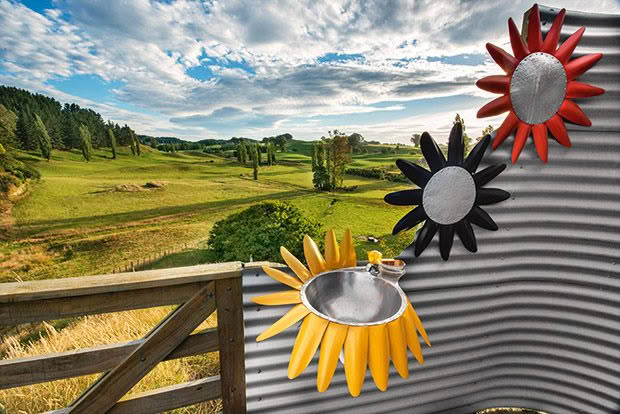
If you live in paradise and want extra income, it makes sense to invite people to stay. Sheryn shares her lessons hosting visitors from near and far.
Words & photos: Sheryn Dean
The trick to running a BnB is making sure you don’t overcapitalise on your set-up costs. A $10,000 investment can take a long time to recoup. But if you already have a space – or, like me, you need accommodation for other reasons – short term rentals can be profitable. I first created a glamping site on my block to host guests doing my Learn about Living Sustainably courses. I also used it when I had an overflow of party guests.
1. SETTING UP ON A BUDGET
My initial plan was to have a picturesque bell tent (they look like a wide, low teepee), but the one I bought wasn’t waterproof. Next, I tried a funky family tent, but I had the same problem, despite numerous coats of waterproofing. One poor guest got flooded out in a downpour.
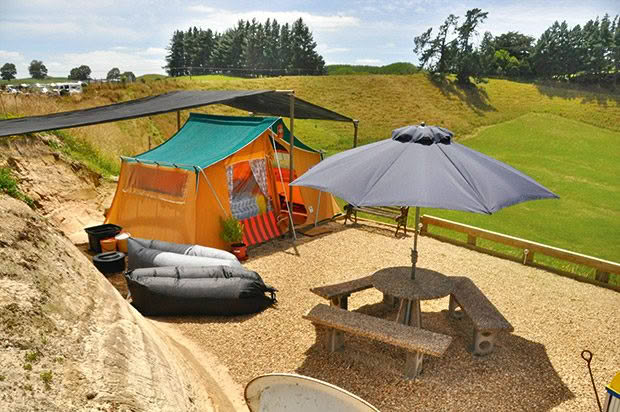
This tent was the original set-up for farm guests, before the womble hole. Despite coats and coats of waterproofing, it leaked like a sieve.
It was also hot in summer, cold in winter, and colonised by slaters and spiders between guests. That’s when I upgraded to an underground bedroom made out of recycled materials. The bedroom (pictured above) is a disused fibreglass tank, laid on its side and buried to provide insulation.
I found the floor at a demolition site in Taupo. The dresser came from the inorganic collection on the side of the road in Tauranga. The only thing I bought was the French doors (second-hand on TradeMe). Even the bookshelf was recycled out of an old headboard.
2. NZ VS OVERSEAS TOURISTS
Domestic travellers differ from corporate and international visitors. They’re going for short getaway weekends, popping down the road on a Friday night, relaxing and exploring on Saturday, and having a leisurely drive home on Sunday.
International tourists keep the weekdays busy. Now, weekends are busy and bookings during the week are few.
3. WHAT’S ON OFFER
Kiwi travellers want something different from home. It might be the peace and quiet of a rural setting after the city’s hustle and bustle, a wonderful view, a regional attraction to visit, or an activity such as tramping or a bike trail.
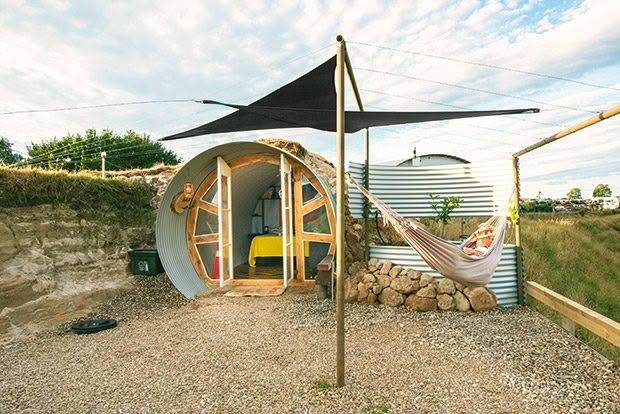
How this BnB got its name: I christened my BnB The Womble Hole, due to its recycled nature. But pre-Covid, most of my guests were young and from the wrong side of the Atlantic – Americans have never heard of wombles. Almost all of them stayed with me because it’s just 20 minutes to Hobbiton, NZ’s most popular tourist attraction. I changed my marketing and renamed it The Hobbit Hole. However, now I’m hosting only NZ tourists, I’ve changed it back to The Womble Hole. Here in Tirau – halfway between Hamilton and Rotorua – I have all those options, plus people get to experience life on an organic, sustainable block, meet the animals, and harvest fresh fruit and vegetables. It’s popular and profitable.
4. IT’S HARD WORK
Don’t underestimate the work involved, including:
• cleaning – sanitising really, in the time of Covid;
• administration, including organising availability, asking for reviews, and messaging guests;
• being accessible to your guests.
It sounds simple, but it takes considerable time even if you allow guests to self-check-in and check-out.
Sheryn’s tip: Find someone who can clean and act as a host when you’re not available. They need to be trustworthy, a people person, someone who knows your block and systems well, and available to fill in for you if you’re unwell or going away.
5. YOU NEED TO BE A MARKETER
There are numerous ways you can market your accommodation. Again, be careful of over-capitalisation. Two of the most popular options are Airbnb and BookaBach. These websites market, schedule, and manage payment for you in return for a fee per booking. I think they’re quite reasonable for the services they offer.
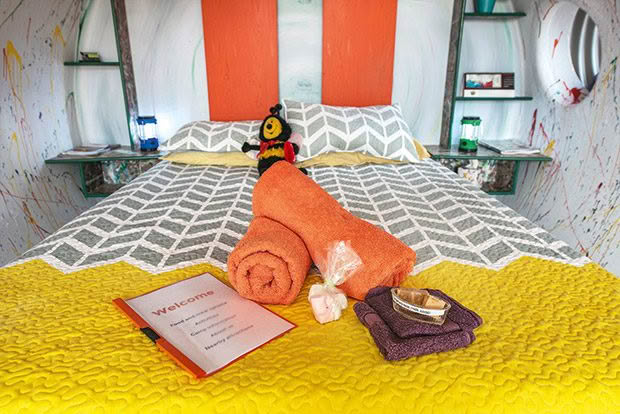
I chose to use Airbnb as it targets my market – the more adventurous couple who want something unique – and have found them excellent to deal with. BookaBach seems more popular with families and groups wanting to rent entire houses. There are numerous other websites you can choose.
Sheryn’s tip: Lots of things are done online these days. However, I’ve found it pays to make an appointment and meet your local i-SITE manager in person, so they know of your facilities and can recommend you.
i-SITE is run by Tourism NZ and includes activity and accommodation listings. Around 38% of international visitors to New Zealand use an i-SITE, and over half of them say using i-SITEs influenced their decisions.
6. BE CLEAN
Cleanliness, cleanliness, cleanliness. Pre-Covid, it was the basics and checking the mattress for bed bugs. Now, one speck of dust shows you haven’t sterilised surfaces as people expect.
Most providers have a set of guidelines for Covid hygiene levels, including safeguarding yourself, cleaning, sanitising, ventilating, and then resetting the room with uncontaminated consumables (bedding, cutlery, cups etc).
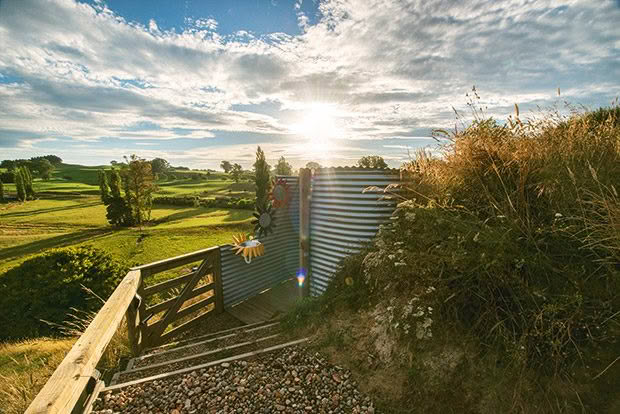
Covid precautions such as registering for a Covid Tracer QR code (or registration), masks, and self-distancing are recommended. But Covid aside, no-one wants to stay in a dirty room. It’s important to clean everything, especially under the bed, behind doors, the underside of shelves, and other spots you might occasionally overlook in your own home.
7. BE UNIQUE
Guests choose to stay with you instead of a bland motel room because they want personality, so don’t be afraid to express it. Don’t overwhelm them with personal mementos because then it can feel like they’re intruding into your personal space. However, you also want it to be different.
Your area might suggest a theme. If your region’s attraction is trout fishing, decorate it with fishing memorabilia. If it’s a bird sanctuary, have an avian theme.
8. GO FOR LIGHTER COLOURS
Dark colours hide dirt, so decorate and furnish with this in mind. I’m the last person who wants to promote boring beige and clinical white linen, but there’s a good reason why it’s used in professional accommodation. I go for light pastels and subtle textures, so it’s interesting but still obviously hygienic.
9. BE FRIENDLY, YET RESPECTFUL
International visitors frequently want to chat and know about my lifestyle. They’ve often spent weeks in each other’s company and are keen to talk to a local and explore cultural differences. I’ve found domestic travellers aren’t the same but can be too polite to say so.
I’m welcoming, friendly, and let them know I’m open to more interaction if they want it. That way, I’m respecting that this is their getaway and that they might want the time to themselves.

I always invite guests to join me in my morning rounds feeding the animals, saying I’ll be at the shed at 9am every morning. If they do join me, it’s a great time to show and tell while you get the chores done.
10. BE OPENLY OPEN
Friends of mine in a same sex relationship recommended I specify that I was ‘gay-friendly’ in my advertising. I initially resisted. I’m open to anyone regardless of race, creed, religion, or sexual orientation, and I didn’t want to discriminate by explicitly inviting one or the other.
But they pointed out they’d been made to feel unwelcome by other accommodation providers and now no longer book a place unless specifically welcomed.
I took this on board in my own way. I now include a photograph of a beautiful rainbow over my glamping site and title the picture ‘All Welcome’. That message seems to have been well received as I get a diverse range of guests.
11. DELIVER ON YOUR PROMISES
Domestic travellers don’t just want a bed for a night, but an experience different from their home, so what are you offering:
• peace and quiet?
• a rural experience?
• proximity to attractions?
• a fun and funky space?
Ensure the message is clear in your advertising and delivered on arrival. For example, don’t offer peace and quiet if your neighbour is cropping or weaning calves.
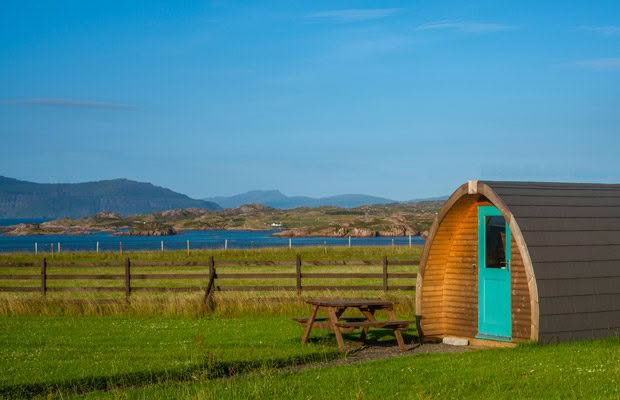
I offer people the experience of an organic, self-sustainable lifestyle. Ducks and dogs visit the glamping site when they feel like it. Pet pigs and sheep line up for treats over the fence. Fruit and excess vegetables are shared. The information sheet I provide to guests describes how everything in the glamping site has been repurposed and recycled.
13. PROVIDE THE COMFORTS
It’s a good idea to ‘holiday’ in your accommodation, so you can figure out what’s missing:
• would a blanket to snuggle under outside be useful?
• insect repellent and fly spray?
• tissues?
• is it easy to read with the bedside light?
• is there somewhere to put your bag and leave your toothbrush?
I have options for guests, including:
• books and magazines, which I make clear guests are welcome to take or swap;
• a pack of cards and board games;
• fresh flowers or homegrown fruit.
14. PROVIDE GREAT SERVICE FOR VISITORS TO RETURN AND RECCOMEND
You want everyone’s visit to be as good as possible. Get it right, and you’ll also increase your occupancy rate. Never underestimate word-of-mouth advertising.

Airbnb has a review and rating system, which greatly increased my guest numbers once I got to ‘superhost’ status, but a surprising number of bookings come from personal recommendations.
Read more: how you reach Airbnb’s ‘superhost’ status.
15. PROVIDE A WELCOME MANUAL
If it takes more than one button to turn on the TV, you need to provide clear, written instructions. It’s the same with the wifi password (make it a simple one) and any other quirks of the space.
Make a list of local recommendations on where to get the best coffee, nearby attractions and places to exercise, and local eateries. People appreciate local knowledge.
16. COMMUNICATE CLEARLY
Ensure directions are clear and straightforward for a tired stranger arriving in the dark. Self-check-in and check-out remove the responsibility of your attendance when guests arrive or leave.
However, if you want them to knock on the door on arrival, make sure you clearly communicate this. Run messages and instructions past a friend to ensure it’s not open to misinterpretation. Be as precise and clear as you can.
17. GO THE EXTRA MILE
Guests like to feel special. Unless I have a booking for the following night, I offer my guests the convenience of a late check-out, then schedule cleaning for the next day.
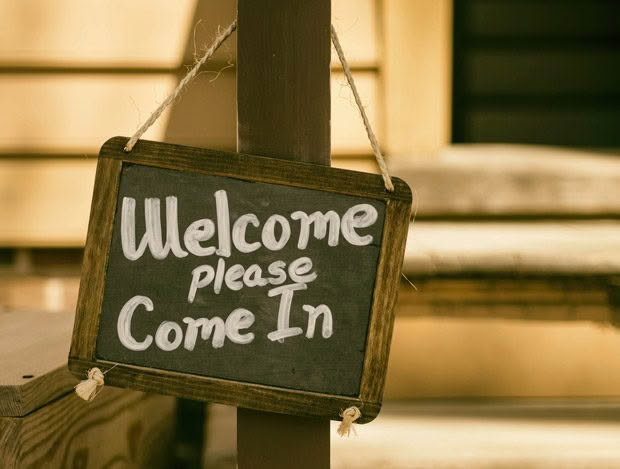
I also provide firewood and a safe, easy-to-use brazier, which is often well appreciated by city folk visiting the country. A little bag of marshmallows wrapped in some cellophane and ribbon adds a special touch.
18. DISHES
There seems to be varying etiquette among those I’ve asked when it comes to the subject of dishes in hired accommodation. Some wash on arrival. Some wash before leaving to avoid a cleaning penalty. Some don’t wash at all.
As a host in a Covid environment, you must sterilise all dishes between guests. I choose to tell my guests that they should enjoy their holiday and not worry about the dishes. Everything goes through the dishwasher.
19. PETS AND KIDS
Kiwi travellers are more likely than international tourists to have children and/or a dog. My facility isn’t set up for families, but hosting dogs is easier than I thought. I’ve found those who travel with their pets are conscientious and considerate. The following has made their stay enjoyable for us all.
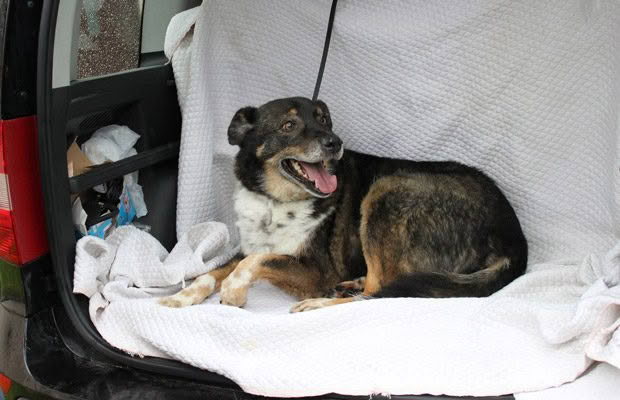
• Dogs must be treated for fleas and worms at least 24 hours before arrival.
• I provide a clearly labelled poo shovel and a collection bucket.
• I include a pet blanket for the dog to sleep on.
• They must control their dog near my free-ranging ducks and chickens.
20. HAVE A GUEST BOOK
Most guests are hesitant to give feedback face-to-face, but a pretty book with an invitation to write in it has proved popular. Guests have left me amazing pictures, drawings, and lovely comments. Best of all has been feedback about what they liked or things that could be improved.
Sheryn’s tip: An unlimited, good wifi connection is an expectation, unless the goal is to go completely off-grid – if so, make it clear.
MORE HERE
Love this story? Subscribe now!
 This article first appeared in NZ Lifestyle Block Magazine.
This article first appeared in NZ Lifestyle Block Magazine.
